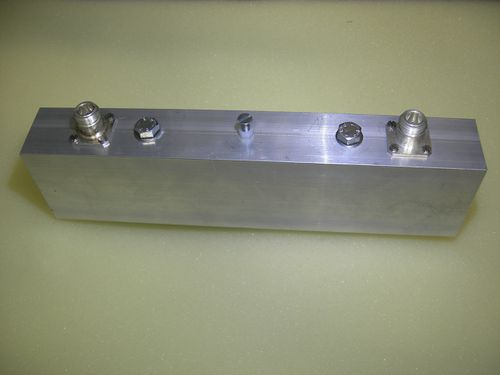Accessories:External Filters
Basics
Most of us do live in an area where they are not alone. Many transmitters are around us, not just those that we really want to receive. It is then the task of the receiver to make a selection of the radio spectrum that is actually of interest. This is done with filters at the input. Unfortunately, for the radar signals on 1090 MHz, such filters are either large or do have significant attenuation, usually 3dB (half of the signal is lost). I decided not to put any filter at the input but instead use a proven high IP (Intercept Point) device directly at the input, which is significantly more robust against out-of-band signals as the low current amplifers used in others. I did not want to have this degradation at this point because these 3 dB loss fully adds to the noise figure and herewith to the sensitivity of the device. The Mode-S Beast much more should be a device mainly designed for sensitiviy. The story tells that only in a few cases strong out-of-band signals disturb reception, so this decision was correct.
Anyway, in just a few cases there are too strong signals degrading the Beast's performance. From my long-term RF experience I know that an external filter can be made so that the system performance does not degrade. These filters are large, based on a mechanical construction and not able to be integrated onto the PCB, as you see in below photos. But the parameters reached with these filters are really outstanding and worth the effort.
The Filters
Why is there even a gain when inserting additional atttenuation?
When adding a external filter, we add attenuation and degrade the noise figure, but if at the same time the bandwidth becomes less, so less atmospheric noise passes through into the receiver. One can really see that the number of frames per second raises when the filter becomes inserted while the range increases a little bit.
Here is a calculator where you can enter noise figure and bandwidth of your system. You may edit the first two lines in below table in order to see the effect of an external filter. Video-Bandwidth and Sigma are best knowledge assumptions.
The original values as I claim are:
Mode-S Beast standalone: Noise Figure 2.0 dB, RF bandwidth 30 MHz Mode-S Beast with 3 pole filter: Noise Figure 2.5 dB, RF bandwidth 13.5 MHz (see measurements below) Mode-S Beast with 5 pole filter: to be confirmed with next build
TODO CALCULATOR
This calculation was created by my friend Luis Cupido, CT1DMK. Thanks, Luis!
